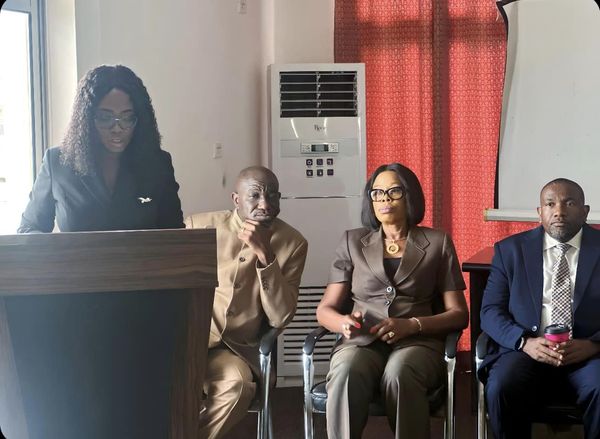But Will Most Of The Outgoing Officials Comply?
PHOTO: Some Commissioners of the LACC at Friday’s news conference (Left is Chairperson Cllr. Zoe)
By Our Staff Writer
The Liberia Anti-Corruption Commission is poised to take punitive actions against any official of the outgoing CDC government who will not declare their exit assets by a December 12, 2023 deadline set by the Commission, LACC Chairperson, Cllr. Alexandra K. Zoe told Journalists in Monrovia at the weekend.
Speaking at the first Official Press Conference of new LACC leadership, Cllr. Zoe emphasized the importance of the Exit Declaration and ordered all outgoing officials to comply with the latest notice of the country’s anti-graft agency, which is crucial in the fight against corruption,
Earlier, the incoming UP government of President-elect Joseph Nyuma Boakai repeatedly said that fighting corruption and conducting audit of the outgoing CDC government of President George Manneh Weah will be one of its immediate priorities in addition to roads and infrastructural developments as well as improvement of the agriculture, health and education sectors.
According to the LACC, the outgoing officials must comply with this notice on or before December 12, 2023.
It is yet to be seen whether most of the outgoing officials of the current regime will comply with the December 12 ultimatum date given by the LACC, because upon taking power in January 2018, majority of the CDC government officials led by President Weah were very reluctant to do so. They only grudgingly complied with the asset declaration law after mounting public pressure.
“The Declaration form can be downloaded from the LACC website @www.lacc.gov.lr, LACC Contact for Exit Declaration is Patricia Barnaby/ Asset Declaration & Verification Officer; contact number: 0886 498 725,” Liberia’s anti-corruption Commission has said.
A top member of the Boakai Team and former head of Liberia’s General Auditing Commission (GAC), John Morlu has written on the Social Media this week that:
“We are launching a decisive campaign against corruption, and Joe Boakai has unequivocally pledged to reclaim misappropriated funds. Liberian officials have brazenly devised various deceptive schemes, ostensibly in support of the impoverished or private sector, only to channel funds into political favors.”
Enforcing the declaration of assets and verification is one of the key functions of the LACC in line with constitutional provisions and “In fulfillment of the Article 90(c) mandate of the 1986 Constitution of the Republic of Liberia, the June 20, 2014, “ACT OF LEGISLATURE PRESCRIBING A NATIONAL CODE OF CONDUCT FOR ALL PUBLIC OFFICIALS AND EMPLOYEES OF THE GOVERNMENT OF THE REPUBLIC OF LIBERIA,” the LACC says. SOURCE: What is Assets Declaration – Liberia Anti-Corruption Commission (lacc.gov.lr)
In defining what assets declaration is, the LACC explains: “The use of ‘asset declaration’/wealth disclosure is a powerful preventive tool to help public officials avoid unwarranted accusations of conflicts of interest and illicit wealth accumulation. It is also used to increase the confidence level of the general public in their leaders and those occupying positions that are prone to conflict of interest and the use of discretionary power.”
The LACC further explains:
“Asset declaration by public officials and employees of government form the basis for engaging with declarants. Whereas the verification process is a process of corroboration items listed against actuality. Indications of preponderance of discrepancies and cloudiness of declarations may warrant administrative punishment or gravitate to full-scale investigation and subsequent prosecution, as the case may be, pursuant to Part 10.3 Sanctions for False Declaration of the NCoC and PART IV – POWERS OF THE COMMISSION of the LACC Act. Public officials’ declarations have become a part of the global standard that is embodied in the United Nations Convention against Corruption. In Liberia, Assets Declaration and Verification are considered as key components in the fight against corruption. These processes are preventive tools which are useful in helping to minimize corruption and to develop a basis by which officials acquiring wealth can have their income monitored against illicit wealth accumulation.”.

